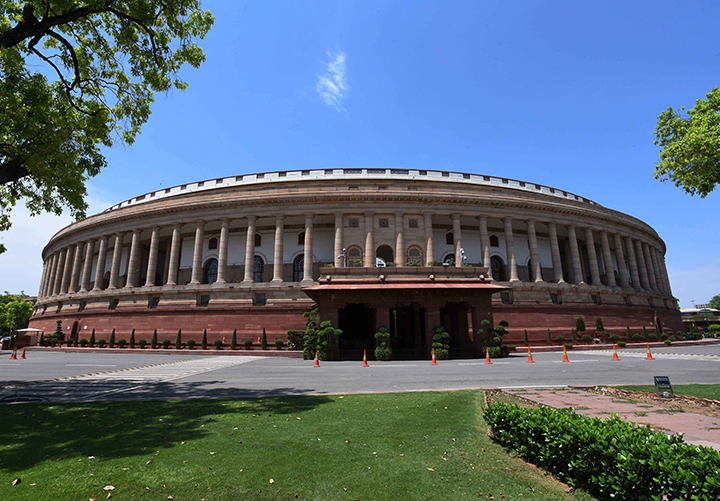In these extraordinary times, the Modi government has resorted to issuing a number of ordinances to deal with emerging situations. They will only be subjected to legislative scrutiny once the situation normalises
On 24 June, the Union Cabinet approved the eleventh ordinance since Parliament was adjourned on 23 March. The government brought a new ordinance amending Banking Regulation Act 1949, that seeks to extend “powers already available with RBI in respect of other banks” to multi-state and urban co-operatives.
While Parliament was not in session and the world was faced with the pandemic, the government took the ordinance route on more than one issue. Article 123 of the Constitution gives power to the president to promulgate an ordinance on the request of the Union Cabinet when both Houses of Parliament are not in session and if he is “satisfied that circumstances exist which render it necessary for him to take immediate action”.
The ordinance carries the full force of the law.“Such Ordinance shall be laid before both Houses of Parliament and shall cease to operate at the expiration of six weeks from the reassemble of Parliament, or, if before the expiration of that period resolutions disapproving it are passed by both Houses, upon the passing of the second of those resolutions.”
Ordinance power is basically an emergency power of the executive. During a pandemic, it is more or less expected that a government would use these emergency powers.
Other important ordinances brought by the government include the Epidemic Diseases (Amendment) Ordinance, 2020. This one gives powers to the central government to regulate the detention of any person intended to travel by any means of transport. The ordinance provides protection to health care professionals against acts of violence. If any person commits such acts, that will be “punishable with imprisonment between three months to five years and a fine between 50,000 and 2 lakh rupees.”
On 5 June, the government brought three ordinances related to the agriculture sector. The Essential Commodities (Amendment) Ordinance, 2020 amending the Essential Commodities Act, 1955 extends powers of the central government to control “the production, supply, distribution, trade, and commerce in certain commodities.” The ordinance aims to increase farmers’ income and market competition.
The two other ordinances with penal provisions in order to safeguard rights of farmers were also brought by the government on the same day. The Farmers’ Produce Trade and Commerce (Promotion & Facilitation) Ordinance 2020 provides “barrier-free” trade. The ordinance ‘prevails’ over state APMC Acts. The penalty provided under the ordinance ranges from Rs 25,000 to Rs 10 lakh for traders and electronic trading platforms which violate provisions of the Act.
The Farmers’ Produce Trade and Commerce (Promotion & Facilitation) Ordinance empowers farmers by setting a framework for sale and purchase. These provisions also prevail over all state APMC Acts. The ordinance says, “It is compulsory that traders make payments to farmers either on the same day or within maximum three working days.”
These two ordinances were promulgated as a part of governments’ Covid relief packages to farmers.
Government also approved a 30% cut in the salaries of all Members of Parliament and a two-year suspension of the MP Local Area Development (MPLAD) scheme by bringing the two ordinances related to Salaries of MP. The saved amount would be used to fight Covid.
“All MPs were feeling that charity begins at home. Therefore, we have decided on an ordinance…Many MPs had contributed their MPLAD funds for Covid-19 related measures. So, instead of piecemeal efforts, a comprehensive decision was taken to suspend MPLAD for two years,” said Union minister Prakash Javadekar while addressing the press. He also said that the amount saved from the scheme would be Rs 7,900 crore.
A lot of speculations have been making the rounds due to increased volatility of the market in the time of the pandemic. Government thus announced many relief measures by bringing Insolvency and Bankruptcy Code (Amendment), 2020 ordinance that exempted some companies from “initiation of corporate insolvency resolution process,” PRS Legislative Research reported.
Two ordinances in the field of health were promulgated. The Indian Medicine Central Council (Amendment) Ordinance, 2020 provides for the re-constitution of a Central Council which regulates the education and practice of the Indian Medicine system that includes Ayurveda, Yoga, Naturopathy.
Another ordinance that amends the Homoeopathy Central Council Act, 1973 was brought that sets up the Central Council of Homoeopathy which regulates homoeopathic education and practice.
Ordinances bypass legislators’ scrutiny. Therefore, the government bringing ordinances always gets questioned on the intention. In the first tenure of the Modi government, more than 50 ordinances were promulgated. In comparison, UPA-I had promulgated 36 ordinances and UPA-II had promulgated only 25.
It is not the first time that governments are using emergency powers via ordinances. Successive governments have taken ordinance routes to make laws. The minority Congress government of PV Narasimha Rao issued 77 ordinances during its five-year term. While the Left-backed United Front government supported by the Congress passed only 61 Bills during its tenure 1996-98, the two PMs who assumed powers at different occasions — HD Deve Gowda and IK Gujral — issued 77 ordinances merely within two years.
Ordinances are considered as undemocratic and therefore legal experts often speak against the ordinance route. A seven-judge bench of the Supreme Court headed by then Chief Justice of India TS Thakur in 2017 said, “Ordinance-making power is not a parallel source of legislation” and that “re-promulgation of ordinances is a fraud on the Constitution”.
The apex court also held that the ordinances are not immune from judicial scrutiny if power is “exercised to secure an oblique purpose”.
The fate of the ordinances issued during the pandemic will only be known once a Parliament session starts. Though when that will be, nobody knows.
(Cover: While Parliament was not in session amid the pandemic, the government took the ordinance route on more than one issue // Credit : Getty Images)





